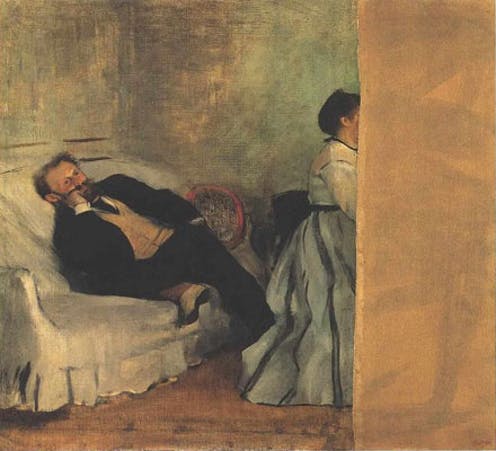
I love men, prefer their company, and sympathize with them, maybe because I had two brothers. Men don’t have it easy—for millennia, they’ve been suffering oceans of anxiety because they had to support their families and fight our wars, but I’m a woman, and I feel as if I’ve been crawling out from under a rock over the last few decades. Our stories are finally beginning to be told well, and it’s a relief to see some sunlight.
An unexpected revelation tripped me up recently, causing me to to burst into an emotional rant, something I almost never do. A male friend confessed that he liked dressing up in women’s clothes. It was a secret that he’d shared with only a few people and he made me promise to hold his secret close.
In due time, he showed me the clothes stored in a dresser standing in an obscure corner of his attic. They reminded me of the mother in Psycho. Frills, lace, little flowers on the polyester, those small scarves we used to wear on our heads like the Queen. Even if a woman stepped out in those clothes, she would be considered an odd throwback. But hey that’s what he liked. When I asked him what had drawn him to cross dressing, he said, “I have always been curious how it would feel to be a woman.”
That’s when the rant happened.

“You think wearing frilly underwear is what it means to be a woman? It’s more like keeping blood off that underwear when you have your period, those several days every damn month, every month, where you have to go to work with cramps. It’s having men turn glassy-eyed and dismissive when you give your opinion about the New York Knicks. But you know the worst thing? It’s not the pain of menstruation and childbirth or the denial of certain professions or jobs, it’s the torture of thanking the guy for doing the shopping, and him saying ‘you’re welcome,’ and then you go into the kitchen and find he’s left the bags of groceries on the kitchen counter for you to put away.
“Or him feeling proud of himself for emptying the dishwasher and then going out to play baseball with the kids, leaving you to sweep the porch, clean out the refrigerator, sew a button on a coat, wipe up the dog’s muddy footprints in the front hall, the dozen things that he hasn’t even noticed.
“And you’re not supposed to get angry because that would upset the relationship, so you remind him, gently, of chores, and he does them, because you told him to. He’ll comply when you give him a “honeydo” list—men giggle about honeydo lists. But why can’t they figure out what needs to be done? You’ve been at work all day and have to get up tomorrow morning, too.
“After getting angry, and cajoling, and making lists, and begging him to be more engaged, you have to give up because in the end all you feel is anger, and if that anger comes out, you’ll get divorced.
“That’s what it’s like to be a woman.
“And let me remind you that when I was a girl we had to wear girdles and stockings and we couldn’t wear pants except on weekends in the woods.”
I stopped to catch my breath, though a hundred further insults to my dignity were flooding into my brain.
My friend was fascinated. “Wow.”
“You might say that times have changed, that men are woke now, but I don’t think it’s changed so much. Women still do most of the child care even if they have a job, and they still resent it. So some women just stop doing housework altogether and that leaves the world living in shit, but that’s the only way they see to stop being pounded by resentment.”
I was finished for the moment, and I sat back and looked at my friend. He smiled and said, “I still like wearing women’s clothes,” and we laughed together.
Sometimes the world is so ungainly that laughter is the only refuge.
This post was submitted by Ann Anderson Evans, author of the award-winning Daring to Date Again: A Memoir (She Writes Press, 2014).
